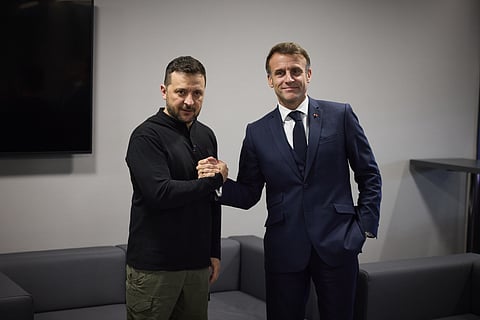

Imagine leading a nation neighboring an alliance that prides itself on unity and collective decision-making. Suddenly, a prominent member of this alliance announces plans to deploy troops into a conflict zone without the consensus of its partners. This scenario is unfolding as French President Emmanuel Macron suggests that sending European forces to Ukraine doesn't necessitate unanimous agreement among EU nations.
The European Union has long championed a collaborative approach to international affairs, emphasizing consensus and diplomacy. Macron's recent statements, however, signal a departure from this tradition, advocating for unilateral action in a highly volatile conflict. This move not only undermines the foundational principles of the EU but also sets a precedent for individual member states to pursue independent military agendas, potentially fracturing the union's cohesion.
For instance, the proposed deployment of a European force to Ukraine, led by France and the United Kingdom, has not garnered unanimous support among EU members. Countries such as Italy, Spain, Germany, and Croatia have expressed reservations about participating, highlighting the discord within the union.
By proposing the deployment of European troops to Ukraine without broad agreement, Macron is steering Europe away from its established diplomatic channels toward a more aggressive stance. This pivot raises concerns about the EU's role on the global stage and its commitment to peaceful conflict resolution. The emphasis on military intervention over dialogue risks escalating tensions and diminishing Europe's credibility as a mediator.
This shift is evident in Europe's recent initiatives to bolster its defense capabilities. EU leaders have agreed that by 2030, the union must be fully capable of defending itself against potential threats, notably from Russia. This decision underscores a move toward a more militarized Europe, potentially at the expense of diplomatic solutions.
Now, place yourself in Russia's position. The prospect of European troops entering Ukraine, can be perceived as a direct threat and provocation. Such actions may compel Russia to respond defensively, not out of choice, but from a perceived necessity to protect its interests and maintain regional stability. This tit-for-tat escalation could spiral into a broader conflict, with devastating consequences for all involved.
Furthermore, Europe's characterization of Russia as a systemic threat and the continuous imposition of sanctions serve to further alienate and antagonize Moscow.
Macron's aggressive approach neglects the delicate balance required in international relations, particularly when dealing with nuclear-capable nations. Unilateral military initiatives, devoid of collective backing and diplomatic groundwork, increase the risk of miscalculations and unintended confrontations. The absence of a cohesive strategy among European allies further complicates the situation, leaving room for discord and weakened responses to emerging threats.
The formation of "coalitions of the willing," bypassing unanimous decisions within the EU, exemplifies this perilous trajectory. While intended to expedite action, such coalitions risk undermining the unity and coherence that have been hallmarks of the EU's approach to international crises.
In recent years, several European Union member states have taken actions that raise concerns about adherence to international agreements aimed at maintaining stability near Russia's borders. For instance, Poland, Lithuania, Latvia, and Estonia have announced plans to withdraw from the Ottawa Convention, which bans anti-personnel landmines, citing increased military threats from Russia and Belarus. This move would permit these countries to stockpile and deploy landmines along their borders, a decision that has drawn criticism from global disarmament advocates due to the humanitarian risks involved.
Additionally, NATO has intensified its military presence in Eastern Europe, with exercises such as the large-scale artillery drills conducted in Finland near the Russian border. These drills involved thousands of troops and showcased advanced weaponry with extended range capabilities, signaling a shift towards a more robust military posture in the region.
These developments reflect a broader trend of EU countries adopting measures that, while aimed at enhancing security, may be viewed as contravening prior commitments to limit military expansion near Russia's borders, thereby challenging the frameworks established to ensure regional stability.
Reaffirming Diplomatic Principles
Europe stands at a crossroads. The path chosen now will define its identity and influence in global affairs for years to come. Embracing unilateral militarism, as suggested by Macron, threatens to unravel decades of collaborative progress and peacekeeping efforts. It is imperative for European leaders to recommit to the principles of unity, consensus, and diplomacy, ensuring that actions taken on the international stage reflect the collective will and uphold the stability that the EU strives to maintain.
While the ambition to assert Europe as a global superpower is understandable, it should not come at the cost of the very values that underpin the union. Constructing a common enemy in Russia to galvanize unity is a precarious strategy that risks escalating conflicts and undermining the EU's role as a harbinger of peace. True strength lies in the ability to foster dialogue, build bridges, and seek resolutions that prioritize stability and mutual respect.